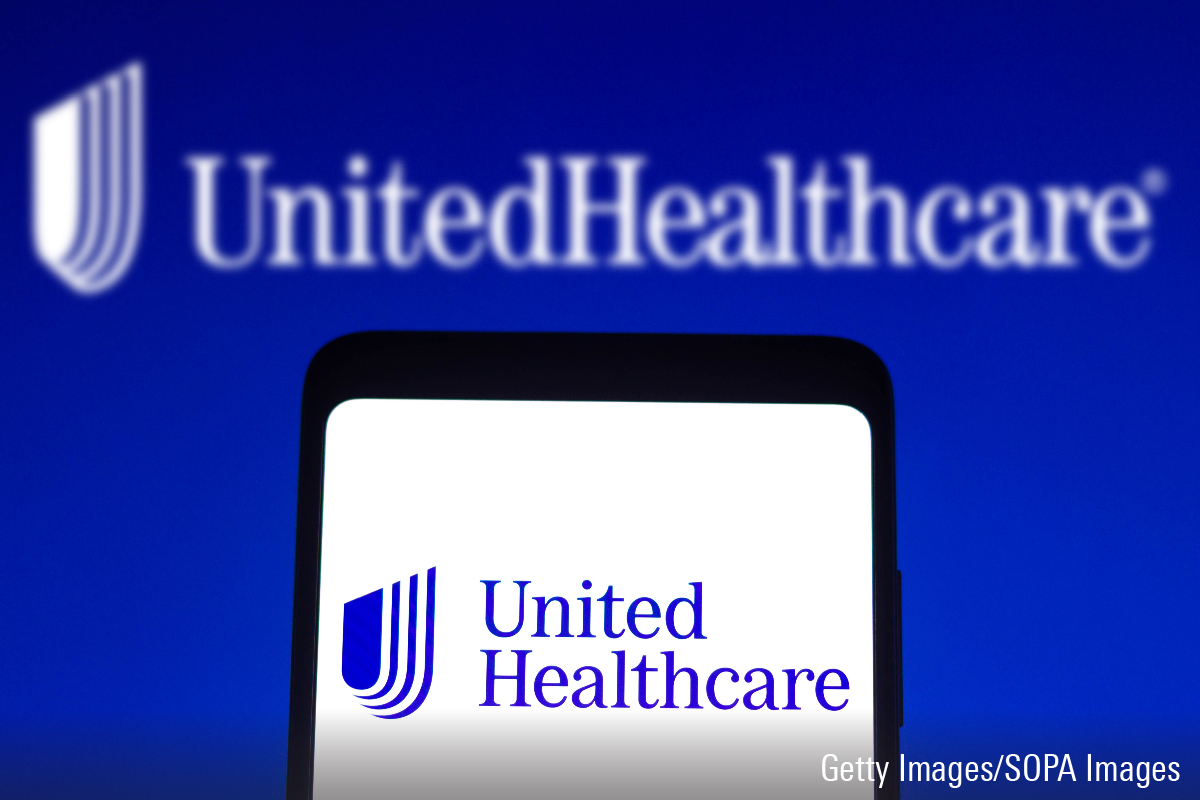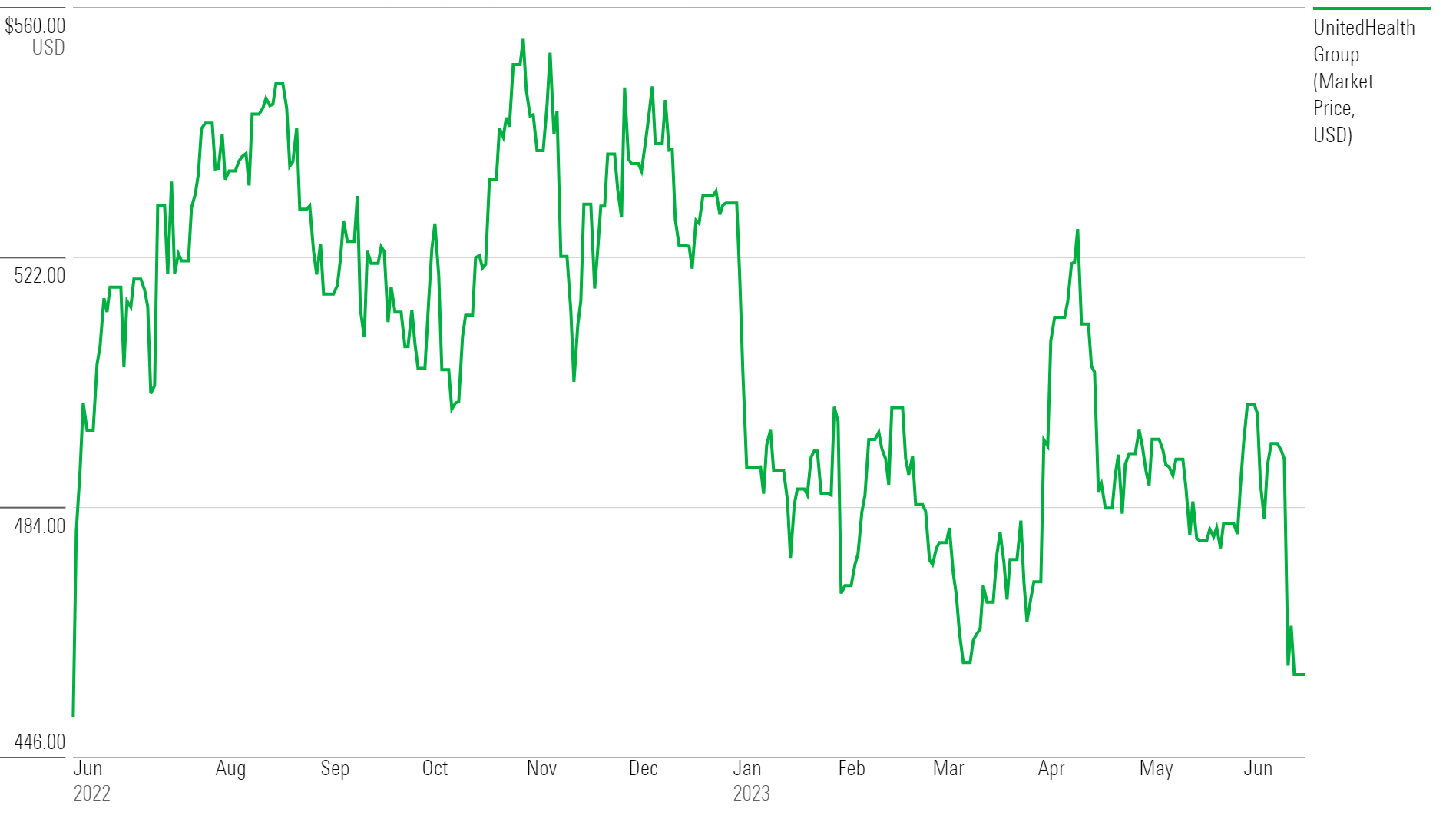Is UnitedHealth Stock a Buy, Sell, or Fairly Valued After Earnings?
Here’s what we think of UnitedHealth stock as surging demand for healthcare could strain near-term margins.

UnitedHealth Group UNH recently provided an update on its outlook for healthcare services demand. Here’s Morningstar’s take on what to think of UnitedHealth’s earnings and stock.
UnitedHealth Stock at a Glance
- Fair Value Estimate: $462
- Morningstar Rating: 3 stars
- Morningstar Economic Moat Rating: Narrow
- Morningstar Uncertainty Rating: Medium
UnitedHealth Stock Update
At a recent investor conference, UnitedHealth executives said the company is seeing surging demand for healthcare services. This trend has the potential to constrain near-term margins in the medical insurance business. However, investors with longer-term horizons should appreciate that management did not change its 2023 guidance. Similarly, even after making minor tweaks to our near-term assumptions, our fair value estimate for the company’s stock also did not change.
If this healthcare bellwether’s experience represents an industrywide trend, demand for healthcare services and related supplies could be seeing an upswing, which could in turn help the shares of service companies (like HCA Healthcare HCA and Tenet Healthcare THC) and related suppliers (like Baxter International BAX and Fresenius Medical Care FMS), while managed care organizations may face margin pressure over medical loss ratio concerns.
The COVID-19 pandemic has largely been a boon for managed care companies and a bust for medical service providers and related suppliers because of weak medical utilization and inflationary pressures. However, UnitedHealth’s comments suggest those trends may be reversing a bit, which could somewhat reverse the stock stories as well.
Because of this news, UnitedHealth’s stock fell toward our fair value estimate, and other managed care stocks also fell significantly. While we view UnitedHealth shares as fairly valued, we believe the other managed care shares—such as 5-star Centene CNC and CVS Health CVS, or 4-star Cigna Group CI, Elevance Health ELV, and Humana HUM—all trade at significant discounts to what we think they are worth, and may have been unduly punished by the market after UnitedHealth’s comments.
UnitedHealth Group Stock Price

Fair Value Estimate for UnitedHealth
With its 3-star rating, we believe UnitedHealth stock is fairly valued, in line with our long-term estimate.
We are raising our fair value estimate to $462 per share from $426 due to recent cash flows and strong trends. Our fair value estimate puts UnitedHealth at 18 times 2023 expected earnings.
Through 2027, we assume revenue will grow 8%, net income 9%, and adjusted earnings per share 12% compounded annually—slightly below management’s long-term goal of 13%-16%. That goal includes capital allocation activities like share repurchases and acquisitions. While we include share repurchases in our estimates, we do not include unannounced acquisitions, so that may be one reason we are slightly below that range.
We expect earnings to grow at a faster pace than revenue due to margin expansion and share repurchases.
Read more about UnitedHealth Group’s fair value estimate.
UnitedHealth Group Price/Fair Value Ratios

Economic Moat Rating
Our narrow economic moat rating for UnitedHealth reflects our general narrow-moat view of the U.S. health insurance and pharmacy benefit management industries, as well as the unclear outlook for economic profitability outside our 10-year explicit forecast period due to regulatory concerns. Still, we believe that as a top-tier U.S. health insurer, pharmacy benefit manager, service provider, and health analytics firm, UnitedHealth possesses enough scale-related cost advantages to generate economic profits for at least the next 10 years. Including goodwill, UnitedHealth’s returns currently are more than double its capital costs, and we project they will remain well above those costs throughout our 10-year forecast period.
We continue to see two primary moat sources: cost advantage and network effects. An insurer’s cost advantages relate primarily to scale on a local basis, although the company operates nationwide. UnitedHealth claims a top spot in the U.S. health insurance market in terms of premiums written and covered lives.
As UnitedHealth’s local market share rises, its negotiating leverage with healthcare suppliers (particularly service providers) also increases, which can create a virtuous cycle wherein the company attracts even more clients and providers to its network. Overall, these dynamics create barriers to entry for would-be competitors, as compiling an attractively priced provider network would be difficult without an established membership pool, and vice-versa.
Read more about UnitedHealth Group’s moat rating.
Risk and Uncertainty
We give UnitedHealth a Medium Uncertainty Rating, with some risks related primarily to potential healthcare policy changes in the United States.
While the near-term outlook appears relatively benign, policy changes could create environmental, social, and governance risks for UnitedHealth, especially during election cycles, as universal access to affordable coverage remains a key concern of the U.S. public.
After nearly universal coverage levels are reached, we would look for regulators to focus on reducing healthcare inflation, perhaps by cutting into the profits of managed care organizations. However, given how slow the progress to such coverage seems to be, we think significant margin compression is a very long-term risk.
Read more about UnitedHealth Group’s risk and uncertainty.
UNH Stock Bulls Say
- UnitedHealth’s strategy of providing medical insurance, pharmacy benefits, and healthcare services creates a powerful alignment of incentives that should help clients control their healthcare costs better than pure-play competitors.
- As the leading provider of Medicare Advantage plans in the U.S., UnitedHealth’s growth should benefit from ongoing demographic shifts and the increasing popularity of these plans among beneficiaries.
- UnitedHealth has managed its balance sheet more conservatively than its peers, giving it more flexibility in a potentially changing regulatory environment.
UNH Stock Bears Say
- Economic downturns could cut into UnitedHealth’s near-term earnings power, especially if employer-based insurance rolls shrink.
- The insurance and pharmacy benefit management industries will likely remain targets of regulators aiming to increase health coverage and reduce the burden of healthcare costs on society until universal, affordable coverage is achieved.
- The law of large numbers may eventually catch up to this healthcare behemoth, making its midteens earnings growth goal difficult to achieve in the long run.
This article was compiled by Maggie Guidici.
Get access to full Morningstar stock analyst reports, along with data and tools to manage your portfolio, through Morningstar Investor. Learn more and start a seven-day free trial today.
The author or authors do not own shares in any securities mentioned in this article. Find out about Morningstar’s editorial policies.

/s3.amazonaws.com/arc-authors/morningstar/27df33e4-c5eb-4dc8-805e-babc7c688b65.jpg)
/cloudfront-us-east-1.images.arcpublishing.com/morningstar/Z34F22E3RZCQRDSGXVDDKA7FGQ.png)
/cloudfront-us-east-1.images.arcpublishing.com/morningstar/5FJIYHKNZRBM3LAKQL2QEUMDTA.png)
/cloudfront-us-east-1.images.arcpublishing.com/morningstar/Q3KIND5VXRCNHHH6JQHCCYBSSA.png)
:quality(80)/s3.amazonaws.com/arc-authors/morningstar/27df33e4-c5eb-4dc8-805e-babc7c688b65.jpg)